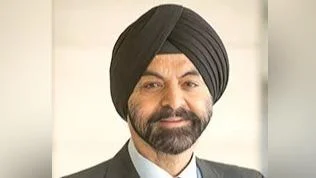Axel van Trotsenburg, Senior Managing Director of the World Bank, addressed the UST-USAID High-Level Dialogue on Financing for Climate Resilience on June 27, 2024. In his remarks, he emphasized the urgency of addressing climate change as 2024 has already experienced numerous heatwaves and record-breaking temperatures.
Van Trotsenburg highlighted a critical situation in South Sudan where "2.2 million children were turned away from schools after temperatures soared to 113 degrees," leading the government to declare a 'serious health hazard.' He noted that over 1.1 billion people currently lack proper access to cooling.
To mitigate climate change impacts, Van Trotsenburg stressed the importance of keeping global temperature rise below 1.5 degrees Celsius. He warned that at the current rate of carbon emissions, "the carbon space for 1.5 degrees is depleted by 2029."
The World Bank aims to allocate 45% of its financing to climate initiatives by 2025, with an equal focus on adaptation and mitigation efforts. For this fiscal year, IBRD and IDA are expected to provide around $30 billion in climate financing.
On adaptation measures, Van Trotsenburg outlined support for early warning systems, resilient health systems, social safety net programs, and more resilient urban infrastructure. He also mentioned investments in nature-based solutions like Singapore's "gardens in the sky" approach.
Cooling technologies are another priority area encompassing both adaptation and mitigation. The World Bank supports energy-efficient buildings, clean cooling solutions for rural communities and agriculture sectors, and climate-friendly vaccine cold chains.
Regarding mitigation efforts, Van Trotsenburg discussed initiatives to reduce methane emissions through waste management and promote energy-efficient technologies that could create economic opportunities while reducing emissions. In India alone, cooling technologies could offer investment opportunities worth up to $1.6 trillion by 2040 and generate nearly 3.7 million jobs.
The World Bank's new Knowledge Compact will launch in July with a strong emphasis on climate issues. The organization systematically evaluates extreme heat effects through Country Climate and Development Reports and tracks beneficiaries better protected from climate shocks via a new scorecard system.
Van Trotsenburg acknowledged that current adaptation finance is insufficient and often used to rectify past mistakes. He called for timely access to better information about climate risk, stronger regulations on land use and infrastructure development—especially in developing countries—and enhanced partnerships among MDBs, DFIs, private sector investors, rating agencies, among others.
In closing his remarks at the event, Van Trotsenburg emphasized the need for increased financing from both public and private sources.

